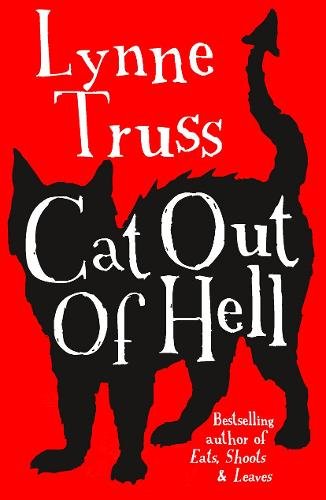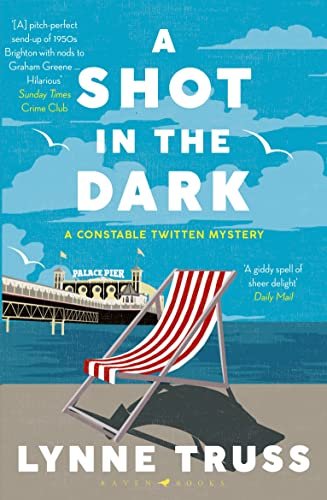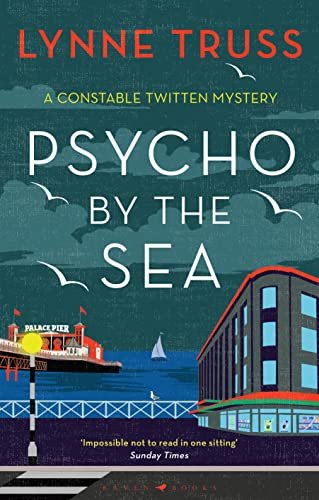BOOKS
Why did I think I could write books?
My very ordinary working-class background was no qualification for authorship (how could I write about Hampstead dinner parties when I’d never been to one?). In the 1980s and 1990s the literary world was utterly dominated by upper-middle-class voices, as I knew all too well from being the literary editor of a national weekly magazine from 1986 to 1991. So was it an act of transgression?
I adored writing all the books listed in this section. My favourite probably remains Tennyson’s Gift from the 1990s, but I also have great love for my more recent Twitten novels, especially Murder by Milk Bottle. I also love the two comic cat-horror novels. Interestingly, the book that took the least amount of time to write was Eats, Shoots & Leaves. I wrote it in six weeks. Blimey.
Early Novels
In the 1990s, I was an extremely busy writer, it seems to me. Looking back, I’m astounded that I wrote three novels alongside all the journalism and radio. I wasn’t even very young in the 1990s, turning 40 in 1995. But having been an editor for so long, and having been completely thwarted for years by abysmal self-esteem, I suppose it all erupted out of me once I started.
Sometimes with festival audiences I have tried to explain the deep feelings of personal unworthiness I’d had in my twenties, but to be honest my old predicament rings no bells in modern ears. All I can say is, after a spell of excellent Cognitive Analytic Therapy, I gave myself permission to write fiction.
With One Lousy Free Packet of Seed
My first novel, set in the world of an ailing gardening magazine. I loved the original cover, and felt I had arrived.
Tennyson’s Gift
My second novel, set on the Isle of Wight in 1864. Great Victorians engaging in photography, painting, poetry… and phrenology!
Going Loco
I have honestly never done drugs – even in the 1990s – but this third, hectic novel does have cocaine overtones, for which I can only apologise.
Cat Books
In the early 2010s my agent Anthony Goff told me that Random House was commissioning a series of horror books under the Hammer imprint, and they had asked if I would contribute to it. I met with the excellent publisher Selina Walker and I think I said straight away that I’d like to try a comic novel about evil talking cats, using a contemporary setting, but evoking the work of the great Edwardian writer M.R. James.
There are many influences behind the first of these two books, Cat Out of Hell – rather obviously, there is Anne Rice’s Interview with the Vampire. The plot is complicated, but emerging from it are some of my favourite characters, especially the two cats Roger and the Captain. The Lunar Cats tells the remarkable (one might almost say unbelievable) back-story of the Captain, when he was a scientifically curious cat in the 18th century, stowing away on Captain Cook’s ship to Tahiti, the Endeavour….
Cat Out of Hell
In which we meet the handsome cat Roger, and learn to fear his lifelong mentor and confederate, The Captain.
Making the Cat Laugh
A collection of columns from the late 1980s (I nearly wrote 1880s, which is worrying) and 1990s, from The Times, Woman’s Journal and The Listener.
The Lunar Cats
A nail-biting tale of good versus evil involving one man, his dog and a group of 18th-century amateur scientific pioneers who just happen to be cats.
It took a while to convert my radio comedy series Inspector Steine into fiction, but I really, really wanted to. The radio series was a joy to write, but I longed to expand on the four principals – pompous Inspector Steine, needy Sergeant Brunswick, insufferably bright Constable Twitten, and the wonderfully sneaky charlady-cum-criminal-mastermind Mrs Groynes.
It wasn’t easy, though. My way of writing them was script-like to begin with, and it took a radical edit of the first three chapters from Alison Hennessy at Raven Books to re-set my brain. The key thing was to find the narrative tone, and to stop making the interactions between the characters carry everything.
One of the joys was doing new research for the books, digging into archives and trying to locate the mad plots in the very real world of Brighton in 1957. The radio series had been just vaguely 1950s, which now seemed rather sloppy of me.
“Twitten” Novels
A Shot in the Dark
Winner of the Crimefest Last Laugh Award 2019.
The Man That Got Away
A Times Crime Novel of the Year and longlisted for a CWA Dagger for Historical Novel
Murder by Milk Bottle
Shortlisted for the Comedy Women in Print Prize 2021.
Psycho by the Sea
Currently prize-less. Boo hoo.
It was very strange when the success of Eats, Shoots & Leaves (in 2003) left me pigeon-holed as a writer whose sole interest was grammar. Up to that point, I had prided myself on my ducking and diving. In fact, it could be said that writing a little book on punctuation actually demonstrated how wide-ranging my interests were.
No one in life gets credit for things they didn’t do, but it might be interesting to note that I didn’t follow up Eats, Shoots & Leaves with ten more books about grammar or language. In a weak moment I did sign up for one, but then I returned the advance. The word “brand” had been mentioned in my presence – “You. Plus language. That’s the brand.” And I was so horrified I ran away to write a book about sport instead.
Non-Fiction
Eats, Shoots & Leaves
International bestseller. Sticklers Unite. You have nothing to lose but your sense of proportion
Talk to the Hand
The world has got a lot worse since this was written, but it will still ring bells
Get Her Off the Pitch
What was it like to be a middle-aged female sports agnostic sent into the field? All is revealed..
Tennyson and His Circle
The portraits in painting and photography that lay behind the story of Tennyson’s Gift
Monologues
A book of monologues that isn’t for acting students is an unusual proposition, so I’m very grateful that Profile Books allowed me to publish A Certain Age in 2009. They did a wonderful job on the original cover. These pieces had all been heard on Radio 4, performed by a great cast of actors.
A Certain Age
Twelve monologues from the Radio 4 series
Children’s Books
The children’s titles were an idea of an editor at Penguin in New York, who paired me with the illustrator Bonnie Timmons. It was a good match. We both relished the idea of the book, which was to show on facing pages how a few words could be punctuated differently to have different meanings. For example: THE DOGS LIKE MY DAD (no apostrophe: dogs flocking to a nice-looking man), opposite THE DOG’S LIKE MY DAD (with apostrophe: man and dog on a stroll wearing matching jumpers, with similar colouring).
Eats, Shoots & Leaves
Why, commas really do make a difference! A picture book version of Eats, Shoot and Leaves. Illustrated by Bonnie Timmons.
The Girl’s Like Spaghetti
Why, you CAN’T manage without apostrophes!
Twenty-Odd Ducks
Why, every punctuation mark counts!

















